 I listen for what I can affirm. I presume that people have treasured enthusiasms that are worthy of affirmation in some small way, and I try to find out what is it about the football game or even the legislation that seems to address a hope or a fear in that person. I start there and see where we can go. I do that in the classroom all the time, when I say something that leads a student to conclude that I’m not on their side. I try to provoke. I think everything I say I really believe, but I do try and direct it in such a way that it invites a sometimes passionate response, or at least that makes the person feel they must respond in order to be true to who they are. And once they do that, that’s not the end of the conversation. That’s the beginning of more questions.
I listen for what I can affirm. I presume that people have treasured enthusiasms that are worthy of affirmation in some small way, and I try to find out what is it about the football game or even the legislation that seems to address a hope or a fear in that person. I start there and see where we can go. I do that in the classroom all the time, when I say something that leads a student to conclude that I’m not on their side. I try to provoke. I think everything I say I really believe, but I do try and direct it in such a way that it invites a sometimes passionate response, or at least that makes the person feel they must respond in order to be true to who they are. And once they do that, that’s not the end of the conversation. That’s the beginning of more questions.
All in Bookish
 I want to live a contemplative life and, as an extension of that, to be a contemplative writer. I already tend toward that kind of life. I love thinking and getting into the deep space in my mind to explore and make connections. But getting into that space in a meaningful way can be difficult because it requires time and space. If there are no empty spaces for contemplation, there is no contemplation.
I want to live a contemplative life and, as an extension of that, to be a contemplative writer. I already tend toward that kind of life. I love thinking and getting into the deep space in my mind to explore and make connections. But getting into that space in a meaningful way can be difficult because it requires time and space. If there are no empty spaces for contemplation, there is no contemplation.
 Though it shook her, Una loved the book. In fact she turned around and read it again straight through. I wanted to ask about it, but tried to give her space. I wondered how she experienced the story; I wondered at the contours of her approach toward, and immersion in, this particular encounter—with the characters, the tragedy, and ultimately with her own mortality.
Though it shook her, Una loved the book. In fact she turned around and read it again straight through. I wanted to ask about it, but tried to give her space. I wondered how she experienced the story; I wondered at the contours of her approach toward, and immersion in, this particular encounter—with the characters, the tragedy, and ultimately with her own mortality.
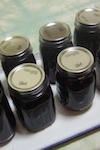 I’m told I’m a good hostess. Plenty of interesting food—down-home victuals perked up by saucy suggestions found in vintage recipe books. I get people talking. I listen for laughter and bring out more food, and by the time the last mug is laid to rest on the coffee table, I’m exhausted. I go to bed saying it was so much work I’m never going to host another dinner. But in the morning I awake smiling, knowing a good time was had by all who came expecting one. Like my mother, I enjoy having entertained, enjoy having offered my home-cooked sustenance.
I’m told I’m a good hostess. Plenty of interesting food—down-home victuals perked up by saucy suggestions found in vintage recipe books. I get people talking. I listen for laughter and bring out more food, and by the time the last mug is laid to rest on the coffee table, I’m exhausted. I go to bed saying it was so much work I’m never going to host another dinner. But in the morning I awake smiling, knowing a good time was had by all who came expecting one. Like my mother, I enjoy having entertained, enjoy having offered my home-cooked sustenance.
Maybe I’m like my mom in yet another way. Mom’s mind-set in me may explain why I continue to pursue creative writing when it’s one of the most strenuous mental workouts I can imagine.
 My first baby was an Advent baby. Born just a few days after the Church calendar turned over in late November, she arrived in the thick of Christ’s own birth season. As such, her birthday (and mine too, in a sense) now serves as a preface to all of my Advent meditations, forever changing the way I come into Christmas each year. It invites me to remember the vivid physicality of her birth — its pure wonder and raw intensity — and to ponder the Christmas story in light of it. Particularly the role of Mary, who was singly invited and appointed to aid in bringing deliverance to mankind through her own very natural delivery.
My first baby was an Advent baby. Born just a few days after the Church calendar turned over in late November, she arrived in the thick of Christ’s own birth season. As such, her birthday (and mine too, in a sense) now serves as a preface to all of my Advent meditations, forever changing the way I come into Christmas each year. It invites me to remember the vivid physicality of her birth — its pure wonder and raw intensity — and to ponder the Christmas story in light of it. Particularly the role of Mary, who was singly invited and appointed to aid in bringing deliverance to mankind through her own very natural delivery.
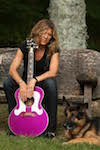 I am contemplative and introverted. I am tactile and love to make things. These are all catalysts for articulating my individuality. I am also an alcoholic, a drug addict, an egomaniac with an inferiority complex and an emotional lightning rod. These things do not supply my identity either, though they are as much a part of me as the traits I cherish. And I am equally grateful for them because the helplessness they triggered ushered me further into dependence on God and finding my place on the path, one step at a time.
I am contemplative and introverted. I am tactile and love to make things. These are all catalysts for articulating my individuality. I am also an alcoholic, a drug addict, an egomaniac with an inferiority complex and an emotional lightning rod. These things do not supply my identity either, though they are as much a part of me as the traits I cherish. And I am equally grateful for them because the helplessness they triggered ushered me further into dependence on God and finding my place on the path, one step at a time.
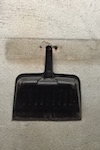 Like committing crummy jokes to memory, remembering is intentional, the discovery of great gain in contentment. Where the debris of spilled baggage reaches its angle of repose, the place where physical objects come to rest along an incline (to borrow from Wallace Stegner), there is rest from the near-constant onslaught of shame, of striving to be enough, to make ourselves worthy, to, in effect, make gods of ourselves. And maybe not being enough is a healthy place to be, a place where God is good and is enough, all the time.
Like committing crummy jokes to memory, remembering is intentional, the discovery of great gain in contentment. Where the debris of spilled baggage reaches its angle of repose, the place where physical objects come to rest along an incline (to borrow from Wallace Stegner), there is rest from the near-constant onslaught of shame, of striving to be enough, to make ourselves worthy, to, in effect, make gods of ourselves. And maybe not being enough is a healthy place to be, a place where God is good and is enough, all the time.
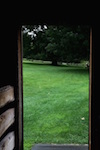 I think fiction writers do have something I lack. They must have the capacity to close their eyes, at least a little bit, to the world outside their window. With eyes half open they are free to imagine. Free to conjure whole worlds and lives. They are magicians as much as artists, and I am the grateful recipient of their magic.
I think fiction writers do have something I lack. They must have the capacity to close their eyes, at least a little bit, to the world outside their window. With eyes half open they are free to imagine. Free to conjure whole worlds and lives. They are magicians as much as artists, and I am the grateful recipient of their magic.
But I cannot close my eyes. Not even a little bit. I write nonfiction because so many memories are tapping at my window, there is no room left in my mind for any invention. I am wholly preoccupied observing and studying that which is already there.
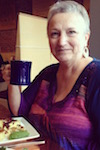 One cold and sleepless night I was suddenly overtaken by a thought that gave me such a panic that I immediately got up, wrapped myself in a quilt, and went to the kitchen to make myself a cup of tea. What if this was it? What if my mother never came back to us? What if all the stories I had heard my entire life went with her?
One cold and sleepless night I was suddenly overtaken by a thought that gave me such a panic that I immediately got up, wrapped myself in a quilt, and went to the kitchen to make myself a cup of tea. What if this was it? What if my mother never came back to us? What if all the stories I had heard my entire life went with her?
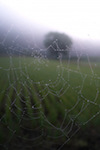 In order to reconcile myself to the difference I feel between Mr. Berry's observation of the world and mine — at my own risk, according to his prefaced warning — I listen to him as I would a prophet rising to an appointed calling, announcing judgment to all transgressors, calling us to change the way we live in order to be spared. He is a surly prophet, but better an ornery prophet than unmerciful judge. I would not want you, Mr. Berry, as my judge. You seem too convinced of my guilt before hearing my story.
In order to reconcile myself to the difference I feel between Mr. Berry's observation of the world and mine — at my own risk, according to his prefaced warning — I listen to him as I would a prophet rising to an appointed calling, announcing judgment to all transgressors, calling us to change the way we live in order to be spared. He is a surly prophet, but better an ornery prophet than unmerciful judge. I would not want you, Mr. Berry, as my judge. You seem too convinced of my guilt before hearing my story.
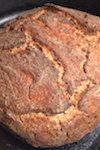 For a long time, I did not love poetry.
For a long time, I did not love poetry.
I read poetry. I memorized poetry to get me through a job that left me weary from boredom. I tried to understand poetry. But I didn't love it.
I loved words. Any words. Words in books, words in songs, words on the shampoo bottle. I loved stories — long ones, short ones, fat ones, skinny ones. I loved metaphors. I even loved select poems. But I did not love poetry.
In the Name of the Father
I did not know then nor do I know now the full nature of God. No one does, but we’re given glimpses through the revelation of nature, the testament of history and its saints, and especially through the ordinary people who love us and mark our days. As a child my earthly father represented whatever goodness, safety, and unconditional love there was to be found in this world. And that has everything to do with why I call myself a Christian today, and can still refer to God as Father, problematic though it may be for me as a 21st-century woman.
Talking About God in Public
Out of belief comes life and all its attending stories. I have, over the last ten years deliberately chosen to keep some of these stories quieter or even private. Other than a few interviews and the occasional post here and there, I’ve required of myself what I’ve so often hoped for from others — a little reserve, maybe even silence. And so, on the topics of God, People, and Place — interdependent topics I’m very passionate about — I had gone mostly quiet.
 We may ask ourselves, how are we Christ-imprinted? What is God calling us to do and be as we stand awed and fearful before some significantly burning bush? What needs to happen for us to receive some kind of stigmata — some signals that mark us as Christ’s own. Not, perhaps, the bloody wounds in the palms of the hands, but the pure, open, joyful, and contrite heart that God has promised to claim for Himself, to not despise, and to count as more valuable to Him than any human accomplishment and success.
We may ask ourselves, how are we Christ-imprinted? What is God calling us to do and be as we stand awed and fearful before some significantly burning bush? What needs to happen for us to receive some kind of stigmata — some signals that mark us as Christ’s own. Not, perhaps, the bloody wounds in the palms of the hands, but the pure, open, joyful, and contrite heart that God has promised to claim for Himself, to not despise, and to count as more valuable to Him than any human accomplishment and success.
 A hammock of flimsy web that should rip apart, but doesn’t. A hammock anchored to thin twigs that should break, but don’t. You climb in and hope it holds. I like to wonder about the nature of all this unseen support that offers not only the safety of the curl but the strength of the swing. I imagine the catch of angels; God’s infinite palm; the unknowable, immeasurable, yet nevertheless concrete woof and warp of divine will and presence.
A hammock of flimsy web that should rip apart, but doesn’t. A hammock anchored to thin twigs that should break, but don’t. You climb in and hope it holds. I like to wonder about the nature of all this unseen support that offers not only the safety of the curl but the strength of the swing. I imagine the catch of angels; God’s infinite palm; the unknowable, immeasurable, yet nevertheless concrete woof and warp of divine will and presence.
Then I look around.
 In my writing about my friend, I embellished certain details. I filled in the holes. And as a result, if I’m honest, I’m not sure which parts of the story are true, as in truly happened, and which parts I’ve added, piece by piece, over the years. Was it my need to remember that built this parallel between his eyes and the radio? Did we really smoke pot on a park bench, en plein air, as I’ve so often recalled, or was it cigarettes? Did he hold my hand during the movie we watched together, or did I dream that, too?
In my writing about my friend, I embellished certain details. I filled in the holes. And as a result, if I’m honest, I’m not sure which parts of the story are true, as in truly happened, and which parts I’ve added, piece by piece, over the years. Was it my need to remember that built this parallel between his eyes and the radio? Did we really smoke pot on a park bench, en plein air, as I’ve so often recalled, or was it cigarettes? Did he hold my hand during the movie we watched together, or did I dream that, too?
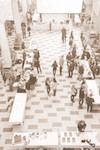 When I sat down last Friday night, I expected to hear an essay — fresh, different, perhaps unpublished — on one of his go-to topics, whether the environment, social justice concerns, or some other aspect of intentional living. Since the day I’d booked him, I’d been waiting for the moment when he’d take the stage and begin reading — his deeply rooted ethos already apparent, piercing — and then I would steal glances around the room to see the shock of recognition on the faces of my students, see the visible signs of narrative transport taking them to a new place with a master at the helm.
When I sat down last Friday night, I expected to hear an essay — fresh, different, perhaps unpublished — on one of his go-to topics, whether the environment, social justice concerns, or some other aspect of intentional living. Since the day I’d booked him, I’d been waiting for the moment when he’d take the stage and begin reading — his deeply rooted ethos already apparent, piercing — and then I would steal glances around the room to see the shock of recognition on the faces of my students, see the visible signs of narrative transport taking them to a new place with a master at the helm.
But something else happened. Not something bad, not less than . . . just different.
 Like any matter of taste, reading well is an exercise in preference, but as I consider the discovery of most of my favorite and abiding titles, I find that each one either came from following a strong writer, mimicking a good reader, or trusting a well-regarded “leader.” And, more often than not, the best of the best cross-check against all three!
Like any matter of taste, reading well is an exercise in preference, but as I consider the discovery of most of my favorite and abiding titles, I find that each one either came from following a strong writer, mimicking a good reader, or trusting a well-regarded “leader.” And, more often than not, the best of the best cross-check against all three!
 So, this winter, I’m finding it worthwhile — even necessary — to name the things that are saving my life. Sometimes I scribble down a list in my journal (a gift from my sister last Christmas, and itself a lifesaver). Sometimes I take the time to write a blog post, with pictures of those purple tulips or a brave blue winter sky. Most often, I’m trading daily texts with my friend Laura, both of us doing our best to find and name the things that are saving our lives. The act of naming them often becomes a lifesaver, a welcome glimpse into the brighter side of this world.
So, this winter, I’m finding it worthwhile — even necessary — to name the things that are saving my life. Sometimes I scribble down a list in my journal (a gift from my sister last Christmas, and itself a lifesaver). Sometimes I take the time to write a blog post, with pictures of those purple tulips or a brave blue winter sky. Most often, I’m trading daily texts with my friend Laura, both of us doing our best to find and name the things that are saving our lives. The act of naming them often becomes a lifesaver, a welcome glimpse into the brighter side of this world.
 It was the hardest assignment I’ve ever been given. It had to be a certain length. It had to work musically with the tone of the visuals. It had to comment on what was going on onscreen without describing it, so it had to add subtext. I loved the challenge, and I’m still really happy with the final product. Auden claimed to have written a poem in every meter style that had ever existed. And if someone came up with one he hadn’t heard of before, he’d write it down and try to create a new poem in that meter. Pure craft, right?
It was the hardest assignment I’ve ever been given. It had to be a certain length. It had to work musically with the tone of the visuals. It had to comment on what was going on onscreen without describing it, so it had to add subtext. I loved the challenge, and I’m still really happy with the final product. Auden claimed to have written a poem in every meter style that had ever existed. And if someone came up with one he hadn’t heard of before, he’d write it down and try to create a new poem in that meter. Pure craft, right?
















